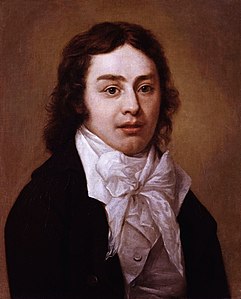To the Reverend George Coleridge, of Ottery St. Mary, Devon
Samuel Taylor Coleridge 1772 (Ottery St Mary) – 1834 (Highgate)
A blessed lot hath he, who having past
His youth and early manhood in the stir
And turmoil of the world, retreats at length,
With cares that move, not agitate the heart,
To the same dwelling where his father dwelt;
And haply views his tottering little ones
Embrace those aged knees, and climb that lap,
On which first kneeling his own infancy
Lisped its brief prayer. Such, O my earliest friend!
Thine and thy brothers' favorable lot.
At distance did ye climb life's upland road,
Yet cheered and cheering: now fraternal love
Hath drawn you to one centre. Be your days
Holy, and blest and blessing may ye live!
To me th' Eternal Wisdom hath dispensed
A different fortune and more different mind.--
Me from the spot where first I sprang to light,
Too soon transplanted, ere my soul had fixed
Its first domestic loves; and hence through life
Chasing chance-started friendships. A brief while
Some have preserved me from life's pelting ills;
But, like a tree with leaves of feeble stem,
If the clouds lasted, or a sudden breeze
Ruffled the boughs, they on my head at once
Dropt the collected shower: and some most false,
False and fair-foliaged as the manchineel,
Have tempted me to slumber in their shade
E'en mid the storm; then breathing subtlest damps,
Mixed their own venom with the rain from heaven,
That I woke poisoned! But (the praise be His
Who gives us all things) more have yielded me
Permanent shelter: and beside one friend,
I, as beneath the covert of an oak,
Have raised a lowly shed, and know the names
Of husband and of father; nor unhearing
Of that divine and nightly-whispering voice,
Which from my childhood to maturer years
Spake to me of predestinated wreaths,
Bright with no fading colors!
Yet at times
My soul is sad, that I have roamed through life
Still most a stranger, most with naked heart,
At mine own home and birth-place: chiefly then,
When I remember thee, my earliest friend!
Thee, who didst watch my boyhood and my youth;
Didst trace my wanderings with a father's eye;
And, boding evil yet still hoping good,
Rebuked each fault and wept o'er all my woes.
Who counts the beatings of the lonely heart,
That Being knows, how I have loved thee ever,
Loved as a brother, as a son revered thee!
O 'tis to me an ever new delight,
To talk of thee and thine; or when the blast
Of the shrill winter, rattling our rude sash,
Endears the cleanly hearth and social bowl;
Or when, as now, on some delicious eve,
We in our sweet sequestered orchard-plot
Sit on the tree crooked earthward; whose old boughs,
That hand above us in an arborous roof,
Stirred by the faint gale of departing May,
Send their loose blossoms slanting o'er our heads!
Nor dost thou sometimes recall those hours,
When with the joy of hope thou gav'st thine ear
To my wild firstling lays. Since then my song
Hath sounded deeper notes, such as beseem
Of that sad wisdom, folly leaves behind;
Or the high raptures of prophetic faith;
Or such as, tuned to these tumultuous times,
Cope with the tempest's swell!
These various songs,
Which I have framed in many a various mood,
Accept, my brother; and (for some perchance
Will strike discordant on thy milder mind)
If aught of error or intemperate truth
Should meet thine ear, think thou that riper age
Will calm it down, and let thy loves forgive it!
Font size:
Submitted on May 13, 2011
Modified on March 05, 2023
- 2:59 min read
- 111 Views
Quick analysis:
| Scheme | ABXCXXXDEFXXXX XGHXIJXKXXXJXXXXDELXLXXXMNICXEOXXXCBDHAXXXFXXXX MXXKGXNXXXXGOXX |
|---|---|
| Closest metre | Iambic pentameter |
| Characters | 3,221 |
| Words | 590 |
| Stanzas | 3 |
| Stanza Lengths | 14, 47, 15 |
Translation
Find a translation for this poem in other languages:
Select another language:
- - Select -
- 简体中文 (Chinese - Simplified)
- 繁體中文 (Chinese - Traditional)
- Español (Spanish)
- Esperanto (Esperanto)
- 日本語 (Japanese)
- Português (Portuguese)
- Deutsch (German)
- العربية (Arabic)
- Français (French)
- Русский (Russian)
- ಕನ್ನಡ (Kannada)
- 한국어 (Korean)
- עברית (Hebrew)
- Gaeilge (Irish)
- Українська (Ukrainian)
- اردو (Urdu)
- Magyar (Hungarian)
- मानक हिन्दी (Hindi)
- Indonesia (Indonesian)
- Italiano (Italian)
- தமிழ் (Tamil)
- Türkçe (Turkish)
- తెలుగు (Telugu)
- ภาษาไทย (Thai)
- Tiếng Việt (Vietnamese)
- Čeština (Czech)
- Polski (Polish)
- Bahasa Indonesia (Indonesian)
- Românește (Romanian)
- Nederlands (Dutch)
- Ελληνικά (Greek)
- Latinum (Latin)
- Svenska (Swedish)
- Dansk (Danish)
- Suomi (Finnish)
- فارسی (Persian)
- ייִדיש (Yiddish)
- հայերեն (Armenian)
- Norsk (Norwegian)
- English (English)
Citation
Use the citation below to add this poem to your bibliography:
Style:MLAChicagoAPA
"To the Reverend George Coleridge, of Ottery St. Mary, Devon" Poetry.com. STANDS4 LLC, 2024. Web. 19 Apr. 2024. <https://www.poetry.com/poem/34393/to-the-reverend-george-coleridge,-of-ottery-st.-mary,-devon>.



Discuss the poem To the Reverend George Coleridge, of Ottery St. Mary, Devon with the community...
Report Comment
We're doing our best to make sure our content is useful, accurate and safe.
If by any chance you spot an inappropriate comment while navigating through our website please use this form to let us know, and we'll take care of it shortly.
Attachment
You need to be logged in to favorite.
Log In